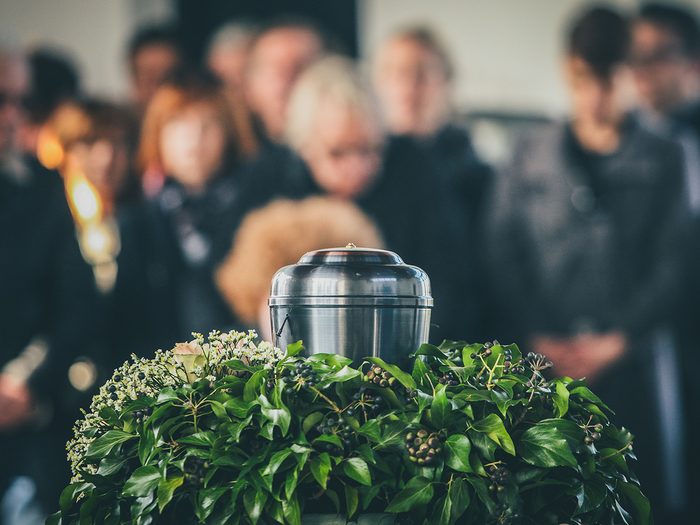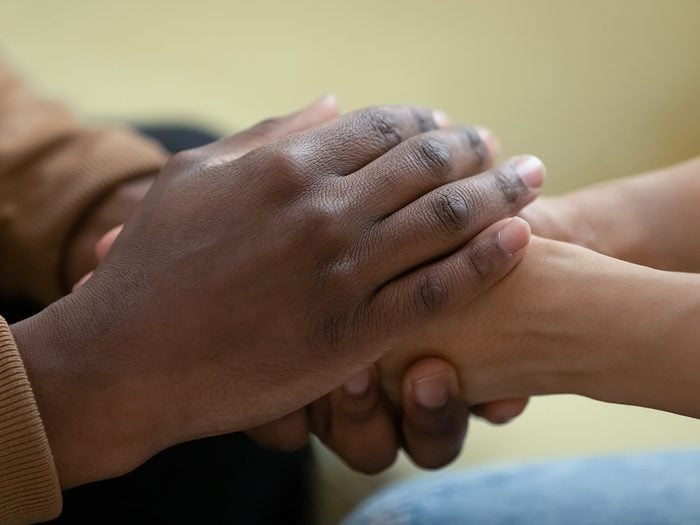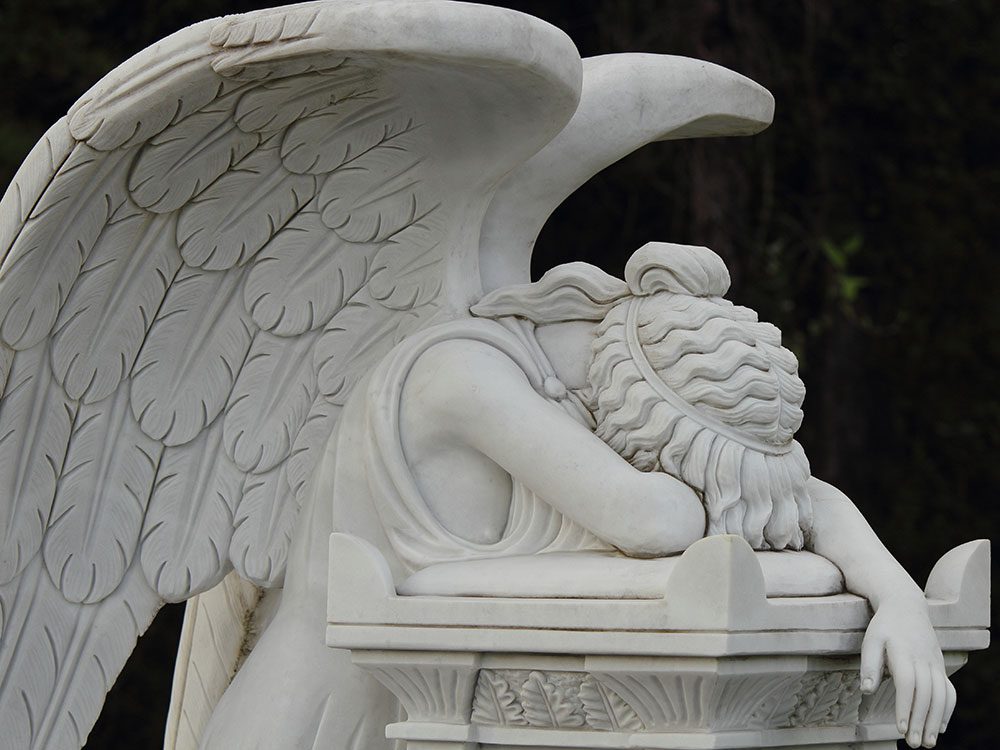
Never say “I know how you feel” at a funeral
Instead, say:“I can’t imagine how you feel.”
By the time we’re adults, most of us will have experienced the loss of a family member, friend or colleague. What’s important to note, however, is that although the phases of grief are similar, we don’t necessarily know how another grieving individual truly feels. “Everyone’s experience is unique,” says Jaime Bickerton, executive director of Bereaved Families of Ontario, Midwestern Region. “Everyone’s loss is the worst, because it’s theirs.”
It can help to think of yourself in a helper role, says author, grief counsellor and director of the Center for Loss and Life Transition, Dr. Alan Wolfelt. “Walk ‘with,’ not ‘behind’ or ‘in front of’ the person who is mourning.”
Read the heartwarming story of how a very special quilt keeps a widow’s memory of her husband alive.

“Time heals all wounds” is something you should never say at a funeral
Instead, say: “Take the time you need and be gentle with yourself.”
“There’s no formula when it comes to grief,” says Asya Hadzismajlovic, executive director of B.C. Bereavement Helpline. “It comes in waves.” The grieving process takes time and important dates like anniversaries and birthdays can trigger an emotional tsunami. Allow the bereaved to move through that process at his or her own pace, advises Wolfelt. “Don’t force your timetable for healing. Allow them to experience all the hurt, sorrow and pain he or she is feeling at the time.”
Are your own funeral arrangements prepared? Check out our ultimate guide to end of life planning.

Never say “At least he didn’t suffer,” “At least she made it to her birthday,” or “At least she died doing what she loved” at a funeral
Instead, say: “I am here for you.”
It’s best to avoid any statements that begin with “at least,” notes Bickerton. These sentiments are often an attempt to make dark days more bearable, but they won’t diminish the pain of losing a loved one. What the person grieving really needs is your quiet presence, says Hadzismajlovic. Check in during the day of the funeral and beyond. “People just want to be heard; to be listened to,” she says. “We say that grief shared is grief lessened.”
Find out more rude conversation habits you need to stop ASAP.

“Let me know what I can do” is something you should never say at a funeral
Instead, say: “Here’s what I can do for you…”
This comment places the burden on the bereaved to reach out for help at a time when they likely don’t know what they need, explains Bickerton. Running a few loads of their laundry, tidying their house or yard and preparing meals are just a few ways to genuinely show you care as opposed to merely saying you care. “If they have 38 casseroles, make the 39th,” says Wolfelt. “Deliver it in your best dish and say you will be over in a week to pick it up. This provides you with an opportunity to check in.”
Read the touching tale of how a casserole brought one family together.

Never say “She’s in a better place” at a funeral
Instead, say: “She will be missed.”
“Most likely, the person grieving is thinking the best place for [the deceased] to be is with them,” says Bickerton. “There’s also a danger of assuming the person ascribes to certain beliefs, which may not be the case.” Simply show your support for your grieving friend, colleague or family member, advises Wolfelt. “At the funeral, a touch of your hand, a look in your eye or even a hug often communicates more than words can say.”
Find out how traditional tips can help us mourn in the modern era.

Never say “It was his time” at a funeral.
Instead, say: “I am so sorry for the loss of your precious [person’s name].”
“This platitude can be particularly upsetting for the grieving person to hear as it implies a reason for the death when they may be feeling the death was senseless or irrational,” says Bickerton. Even if the loved one lived a long, full life, the person grieving would likely have been wishing for many more years together. When expressing your condolence be sure to say the person’s name, advises Wolfelt. “That way the person grieving knows you are genuinely concerned.”
Take inspiration from these uplifting quotes.

Never say “You need to say goodbye” or “Life must go on” at a funeral
Instead, say: “He will always be remembered for his generosity/love for his family…”
Statements like these tend to minimize the grief journey, says Bickerton. “Life will go on but it will look very different for the person grieving as they adjust to their new normal.” A note that shares a favourite memory or relates the special qualities you valued in the person who has passed is a thoughtful way to express your condolences before or after the funeral, says Wolfelt. “These words will often be a loving gift to the grieving person.”
Struggling with your own grief? Here’s expert advice on how to cope with the death of a loved one.